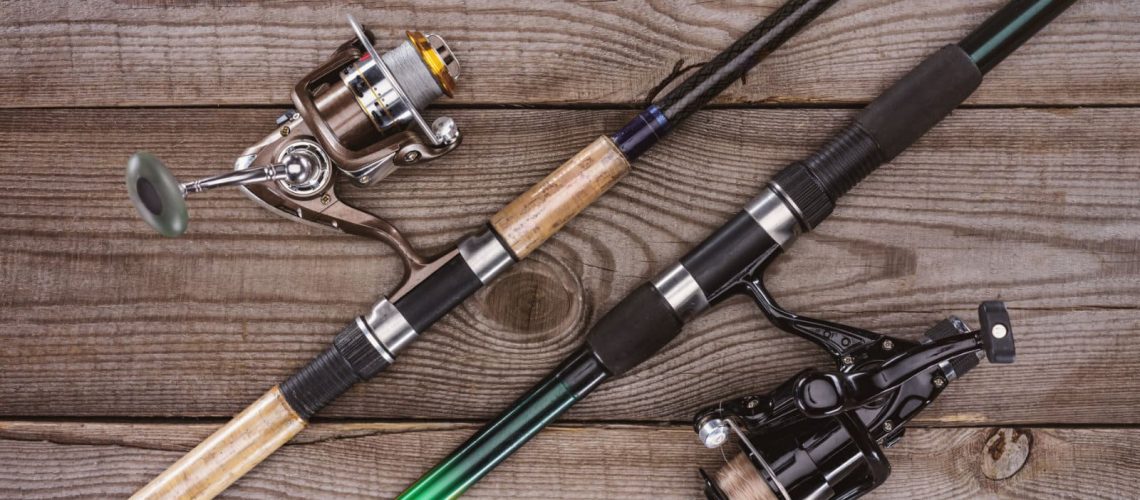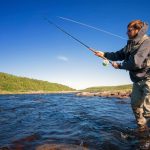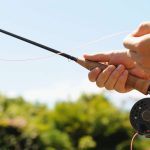Fishing is a fantastic way to connect with nature and enjoy the outdoors, but before you hit the lake or river you’ll need to choose the rod that’s best for you. Carefully selecting the right fishing rod ensures that you’ll get plenty of bites while getting the most out of your fishing adventure. Here are 5 things to look for when selecting the perfect fishing rod.
Type of Fish
Determine first what type of fish you want to catch. Knowing approximately how many pounds and what size your game fish is going to be allows you to pick the rod that’s right for you. Lighter weight or ultralight rods are going to be better for catching smaller species of fish such as trout while heavier rods are used for weighty fish such as bass.
The length of the pole should also be considered. Longer poles cast farther than shorter poles, and are generally used to catch different species of fish. A long cast allows more manipulation of the bait whether it’s a deep diving crank bait, walking bait or another type of reaction bait. Shorter rods provide less bend and save space when fishing in closer quarters and are popular with kayaking anglers and fishers using smaller watercraft.
The Right Reel
Choosing the right reel for your rod is imperative for finding a good balance that gives you control over your casts. Spinning, baitcasting, and spincast reels are the most common types of reels that also require some thought about what type of fish you want to catch.
Baitcasting reels are great for using heavier lures while spinning reels are better for lightweight lures. Determining what reel and type of bait you’re going to use in combination with your rod allows you to choose the best fit with the right feel. You’ll also be able to determine what the overall weight of your rod will be after including the reel you’ve chosen for consistently perfect casts.
Rod Materials
Selecting the perfect fishing rod depends heavily on the materials of the rod itself. Fishing rods are customarily made out of graphite, fiberglass, or a mixture of both. Anglers who prefer lighter bite detection will fancy a graphite rod over fiberglass for its heightened sensitivity; however, graphite rods are stiffer and break easier than their fiberglass counterparts with fiberglass providing significantly more flexibility as many are considered to be virtually unbreakable.
Many rods are made with a combination of fiberglass and graphite, giving you more options for fishing locations and conditions that are ordinarily better suited for one rod material (graphite vs. fiberglass) over the other.
Power and Action
Power and action determine the amount and location of bend on your rod. The faster the action, the more power your rod has to fight bigger fish, but if you’re only after smaller fish that put up less of a fight, then a light action rod with less power and more sensitivity helps to easily detect soft nibbles. The action of your rod is also going to determine the distance of your cast as well as the visibility of your line, so consider whether you want to cast shorter or longer stretches of water before selecting the perfect rod.
The power of your rod also helps you choose which baits work best for the fish you want to catch. Moderate power rods are good for reaction baits (crank, jerk and spinners) with high power rods being better for catching fish with bait that uses less bend.
Price
How expensive a rod is doesn’t necessarily mean that it’s the best rod, and the same can be said for cheaper rods. Find a rod that fits your budget and meets your next fishing expedition’s needs. Many inexpensive rods give you the same bang for your buck as higher-end rods.
The most important factor is how much time you’ll spend using your new rod, so if you do choose a pricier rod, it’ll be money well spent. If, however, your rod just sits in a corner gathering dust even if you didn’t spend a lot on it, then it isn’t money well spent, so consider a group of rods that meet your fishing needs first, then concern yourself with the price. It may be worth it to spend a little more or less, depending on how often you’ll be fishing and how serious of an angler you want to be.
No matter which rod you choose, considering all of your fishing needs from price to power and action puts you on the path to some fun and amazing outdoor adventures and stories you’ll be able to tell with a straight face.





